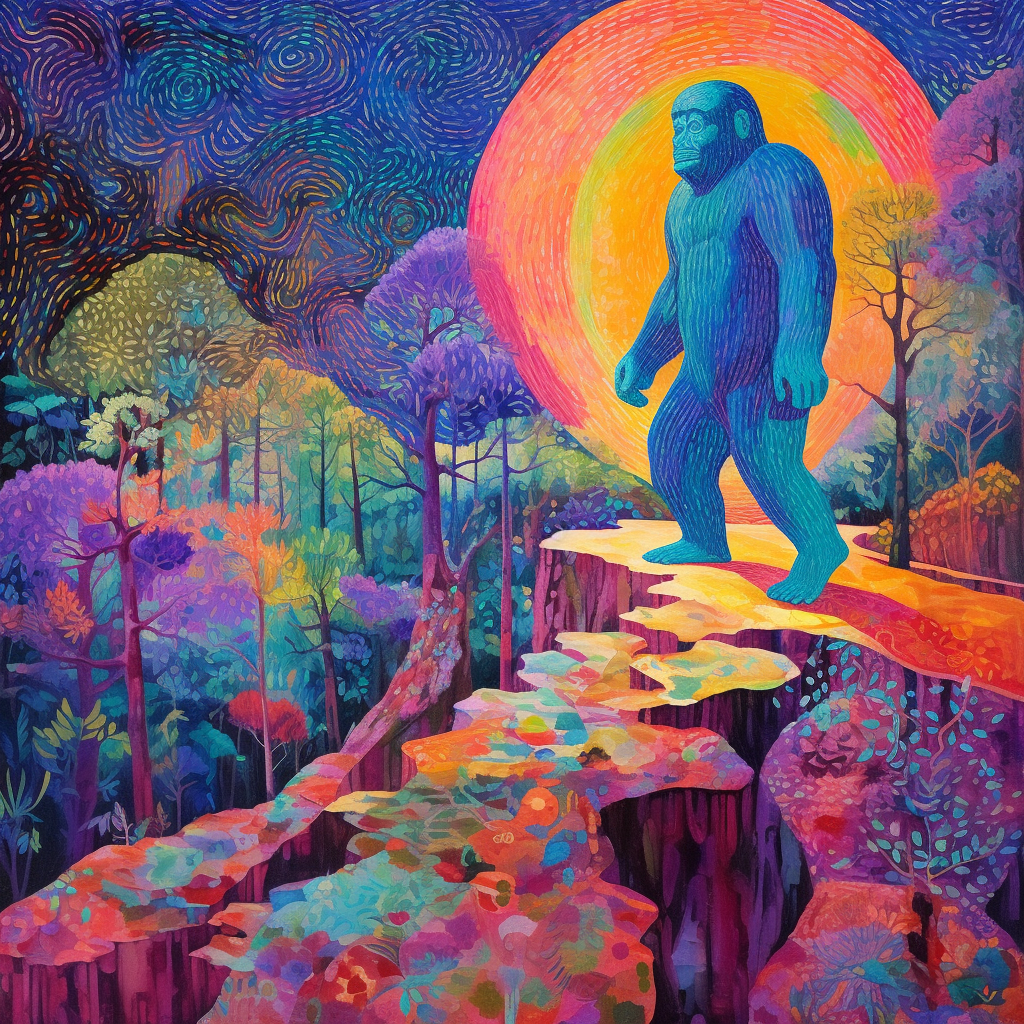We're in Beta 🙃
Imagine our ancient ancestors, roaming the prehistoric savannah with the same curiosity that drives a kid into a candy store. Then, in a plot twist, they encounter perhaps more than they expected... a psychedelic treat in the form of magic mushrooms.
Fast forward a few millennia, and some suggest these fungi may have sparked nothing less than the evolution of human consciousness.
This is the "stoned ape theory," a narrative that's less about the survival of the fittest and more about the survival of the trippiest 🫠.
The ringmaster of this mind-bending circus is Terence McKenna, a name synonymous with entheogens and ethnobotany. He was the psychedelic pied piper who suggested that our cognitive capacities may have been significantly altered by these naturally occurring hallucinogens.
Whether you buy into his theory or not, one thing's for certain: it's a conversation starter that's been passed around the campfire of human curiosity more times than a joint at a Grateful Dead concert.
So, let's sift through the evidence and ponder the big question: Did magic mushrooms help to catapult our hairy ancestors from simple primates to complex, culture-crafting humans?
Psychedelics and Prehistory: A Mind-Altering Hypothesis
Turn the dial back about 200,000 years. Enter: Homo sapiens—nature's newest act.
Our ancestors were just getting the hang of tool-making, language, and the wielding fire. But according to the stoned ape theory, they might have also been dabbling in the world's oldest pharmacopeia—the humble mushroom.
These weren't your average culinary shiitakes, though. These were psilocybin mushrooms, nature's own brain-tickling confections.
Imagine a tribe of Stone Age folks stumbling upon these funky fungi and experiencing the world's first psychedelic rave right in the heart of nature's discotheque.
The stoned ape theory posits that such encounters didn't just result in a prehistoric version of Woodstock. Instead, they may have profoundly impacted our ancestors' gray matter.
It's as if the mushrooms were software updates for the brain, potentially enhancing vision, boosting creativity, and maybe even kick-starting language—a real 'shroom-induced software reboot for the human biocomputer. Cool, huh?
While the idea of ancient humans getting their minds blown by mushrooms is entertaining, it's also a hypothesis that demands some rigorous scientific scrutiny.
Terence McKenna: The Psychedelic Pied Piper

Who was the mind behind this trippy theory?
Meet Terence McKenna, the wizard of psychedelia, and no stranger to the mystical. His voyages through the mind's uncharted territories were legendary.
He was the kind of guy who could talk about mushrooms and make it sound like a secret spell for enlightenment.
McKenna's stoned ape theory was a narrative grenade, lobbed into the trenches of traditional evolutionary thinking. He proposed that psychedelics were an "evolutionary catalyst" that gave our brainpower a turbocharge.
In his vision, our ancestors weren't just surviving; they were thriving on a diet of mind-bending mushrooms, and this, in turn, led to monumental leaps in human evolution.
His hypothesis was as audacious as it was thought-provoking. With the swagger of a rock-star philosopher, McKenna strutted onto the stage of scientific discourse, guitar in hand, ready to riff on the idea that psychedelics were instrumental in the human journey from primitive to profound.
And like any good pied piper, his tune was catchy, luring in those ready to explore the less-trodden paths of human consciousness.
The Science Behind the Stoned Ape Theory
Now let's shift gears from the psychedelic serenade to the nitty-gritty science. How does the stoned ape theory hold up under the microscope?
First up, neurogenesis: the birth of brain cells. Psilocybin, a key component of magic mushrooms, has been shown to encourage neurogenesis1.
It's as if psilocybin were a personal trainer for the brain, encouraging the growth of new neural pathways. Could our ancestors have experienced a similar cerebral workout with their prehistoric psilocybin feasts?
Then there's the Default Mode Network (DMN), the brain's autopilot setting, which psychedelics like psilocybin can disrupt2. This temporary shutdown could be likened to rebooting a computer, providing a fresh start that allows for new perspectives and problem-solving abilities.
Imagine our ancestors, their DMNs dialed down, suddenly able to make quantum leaps in thinking and creativity.
Of course, correlation doesn't imply causation. Just because A occurred together with B doesn't mean A caused B. But in the case of the stoned ape theory, the correlation is intriguing enough to warrant a deeper dive.
Scientists are now examining the effects of psychedelics on cognition, creativity, and emotional health with renewed interest, all thanks to the seeds planted by McKenna's theory.
Even so, the stoned ape theory remains a fringe idea, waiting for its day in the sun—or perhaps its moment under the blacklight of mainstream science. Until then, we can only speculate on the role psychedelics may have played in the odyssey of human evolution.
FAQ
Q: What is the stoned ape theory? The stoned ape theory is a hypothesis proposed by ethnobotanist Terence McKenna. It suggests that the consumption of psilocybin mushrooms by our early hominid ancestors could have jump-started the development of human consciousness, language, and culture. It's the idea that these psychedelic experiences might have expanded the minds of our forebearers, leading to rapid evolutionary advancements.
Q: Is there any scientific evidence to support the stoned ape theory? While the stoned ape theory is an intriguing idea, it remains largely speculative and is not widely accepted in the scientific community. There is evidence that psilocybin can affect brain function in ways that could theoretically support aspects of the theory, such as promoting neurogenesis and altering the Default Mode Network. However, direct evidence linking psychedelic use by early humans to evolutionary changes is lacking.
Q: Did Terence McKenna have any scientific credentials? Terence McKenna was an ethnobotanist, which means he studied the relationships between people and plants. He was well-versed in the use of plant-based psychedelics in various cultural and shamanic contexts. However, he was more of a counter-cultural figure than a traditional academic scientist, and his stoned ape theory is not based on empirical research but rather on his own conjecture and interpretation of evolutionary psychology.
Q: Can the stoned ape theory be tested or proven? Testing the stoned ape theory presents significant challenges. The theory deals with events that occurred tens of thousands of years ago, and direct evidence of psychedelic use by early humans is difficult, if not impossible, to obtain. While contemporary research on psychedelics can provide insights into their effects on the brain, proving a causal link between these substances and human evolution would require evidence that is currently beyond our reach.
Q: Why do people find the stoned ape theory appealing? The stoned ape theory captivates imaginations because it offers a radical explanation for the development of human consciousness, one of the most profound mysteries of our existence. It intertwines the origins of our species with the alluring and enigmatic realm of psychedelics, providing a narrative that is both provocative and tantalizing. People are drawn to the theory's suggestion that our ancestors' psychedelic experiences could have played a foundational role in shaping who we are today.
TABLE OF CONTENTS
Psychedelics and Prehistory: A Mind-Altering Hypothesis
Terence McKenna: The Psychedelic Pied Piper
The Science Behind the Stoned Ape Theory
FAQ
REFERENCES
1. Ly, Calvin, et al. "Psychedelics promote structural and functional neural plasticity". Cell Reports, vol. 23, no. 11, 2018, p. 3170-3182.
2. Carhart‐Harris, Robin, et al. "The entropic brain: a theory of conscious states informed by neuroimaging research with psychedelic drugs". Frontiers in Human Neuroscience, vol. 8, 2014.

